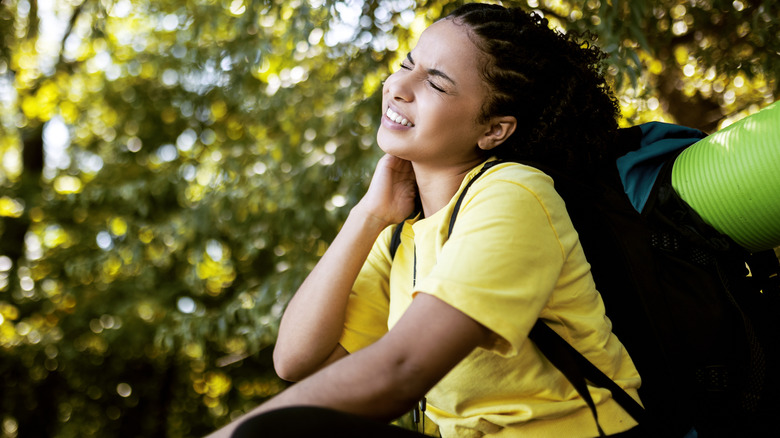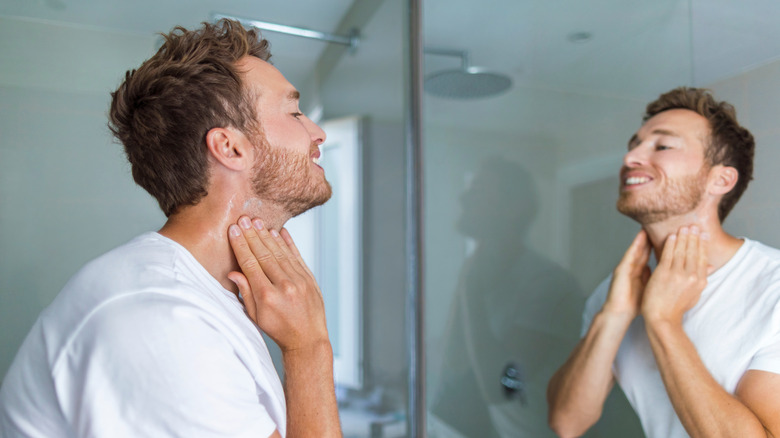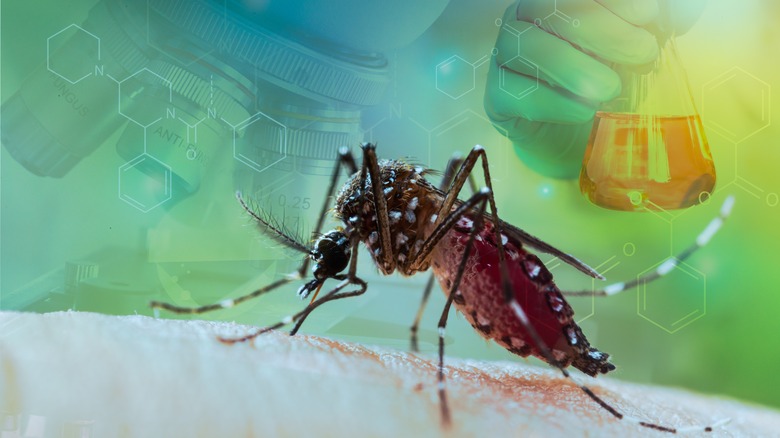Unexpected Factors That Increase Your Chance Of Getting Bitten By A Mosquito
Do you feel like you're getting bitten by mosquitoes more at the family barbeque than your cousin Melissa? Well, you might be. Mosquitoes are attracted to people based on their scent and the carbon dioxide they exhale (per National Institutes of Health). However, a few unusual consequences make you a tastier treat for this backyard nuisance. Studies have shown skin bacteria, clothing color, blood type, and even drinking beer make you mosquito bait.
Mosquitoes are a bane to any backyard barbeque, but knowing why they are attracted to you and keeping them away is more important than just avoiding the itch. Mosquito bites can spread diseases like malaria, dengue, Zika, and West Nile virus. According to the United States Environmental Protection Agency (EPA), many of these diseases can lead to disabling or possibly deadly effects. Removing mosquito habitats, spraying, and using repellants can help protect you during mosquito season.
Take your mosquito protection to the next level by learning why you're a mosquito magnet and how to combat them. It could be as simple as only drinking with your friends when you're in the house.
Bacteria on your skin make you a tasty target
Mosquitoes like how you smell. That's why people might get bitten more when they are sweating.
Your specific odor due to the bacteria on your skin is also a magnet for mosquitoes. Research published in 2021 in Current Research in Parasitology and Vector-Borne Disease showed skin bacteria like Bacillus cereus and Staphylococcus epidermidis produce specific chemicals that attract mosquitoes. Additionally, different skin microbiota can release attractants for mosquitoes due to their metabolism of the volatile products released by oil and sweat glands. The research went on to state that the number and type of bacteria can affect how attractive you are to mosquitoes. This explains why they bite your ankles first. They are attracted to foot odor.
Research in Cell published in 2022 also demonstrated that those with more carboxylic acids on the skin are highly attractive to mosquitoes. These are organic compounds produced in the oily layer of the skin to moisturize and protect it, per Scientific American. Humans have more carboxylic acids than animals, which is why they get mosquito bites more. Sadly, the profile of your skin for bacteria and carboxylic acids doesn't change with time, meaning mosquitoes are sure to always love you.
Since your natural body odor makes you more attractive to these insects, trying to cover it up might help you to not become their next meal. Mosquito Magnet states that smells like citronella, basil, peppermint, and lavender are natural scent deterrents. Using these might possibly help mask your natural allure.
Your clothing plays into a mosquito's preference
In addition to being able to smell you out, mosquitoes have a preference for colors, too. According to a 2019 study in Parasites & Vectors, mosquitoes are attracted to dark colors. In the study, two screens were used as a barrier to collect mosquitoes. The barrier of the darker color contained 50% to 70% more mosquitoes than the lighter. The article also noted that the barrier screen 60 centimeters off the ground saw the most action.
It should come as no surprise that red is a mosquito's favorite color. A study in 2022 in Nature Communications illustrated that mosquitoes prefer colors that correlate with human skin tones, specifically red and orange. Jeffrey Riffell, a UW professor of biology, stated in the University of Washington News, "When they smell specific compounds, like CO2 from our breath, that scent stimulates the eyes to scan for specific colors and other visual patterns, which are associated with a potential host, and head to them."
The professor added, "Filtering out those attractive colors in our skin, or wearing clothes that avoid those colors, could be another way to prevent a mosquito biting." While you can't eliminate the red in your skin, you can cover it with light clothing to throw mosquitoes off your scent. For example, choose white or lighter-colored long-sleeved shirts and pants when cooking outside.
Your blood type draws them, too
When you're donating blood at your local blood bank, they love it when a type O comes in. It turns out mosquitoes like them, too. A 2019 study published in the American Journal of Entomology found that when given feeders of different blood types (A, B, AB, and O), the mosquitoes spent the most time on the feeder of the O blood.
The preference of mosquitoes toward a specific blood type could have something to do with the different blood antigens (per Healthline). For example, A has the A antigen, B has the B antigen, and AB has both antigens on the red blood cell surface. O, on the other hand, has a precursor antigen known as H. This was further shown in the Journal of Medical Entomology research, where participants with the H antigen attracted more mosquitoes than those with the other antigens. In the group, O secretors had 83.3% of mosquitoes landing on them compared to 46.5% landing on A secretors. So, your blood type could help to make you more attractive if you're O.
However, Pfizer states that research into the attraction of mosquitoes to specific blood types could be flawed and speculative. Therefore, skin odors and microbiota are a more critical factor.
Mosquitoes like beer drinkers
It might just be your drink of choice that's making you the main meal for the mosquito hoard compared to your friends. A study in 2002 in the Journal of the American Mosquito Control Association demonstrated that mosquitoes liked the hosts drinking beer more than those who weren't. During the study, 13 volunteers were split into groups of those who were beer drinkers and those who were not. Those who consumed beer were more delectable to the mosquitoes than those who weren't. However, the report also noted that there wasn't any correlation between sweat or skin temperature and mosquitoes being more drawn to the drinking group.
Mosquito scientist Grayson Brown, director of the Public Health Entomology Laboratory in the Department of Entomology at the University of Kentucky, told CBS News that it could have something to do with the CO2 from the opening of the beverage. The scientist stated, "CO2 comes bubbling out of a beer when it's opened. C02 is going to attract mosquitoes that feed mostly on mammals. We know that mosquitoes use CO2 to get close to the mammals."
If you're trying to avoid being mosquito bait, you might try drinking something without alcohol or carbonation when heading to your next barbecue. It might help you to avoid the itch and possible disease transmission that comes with a bite.





